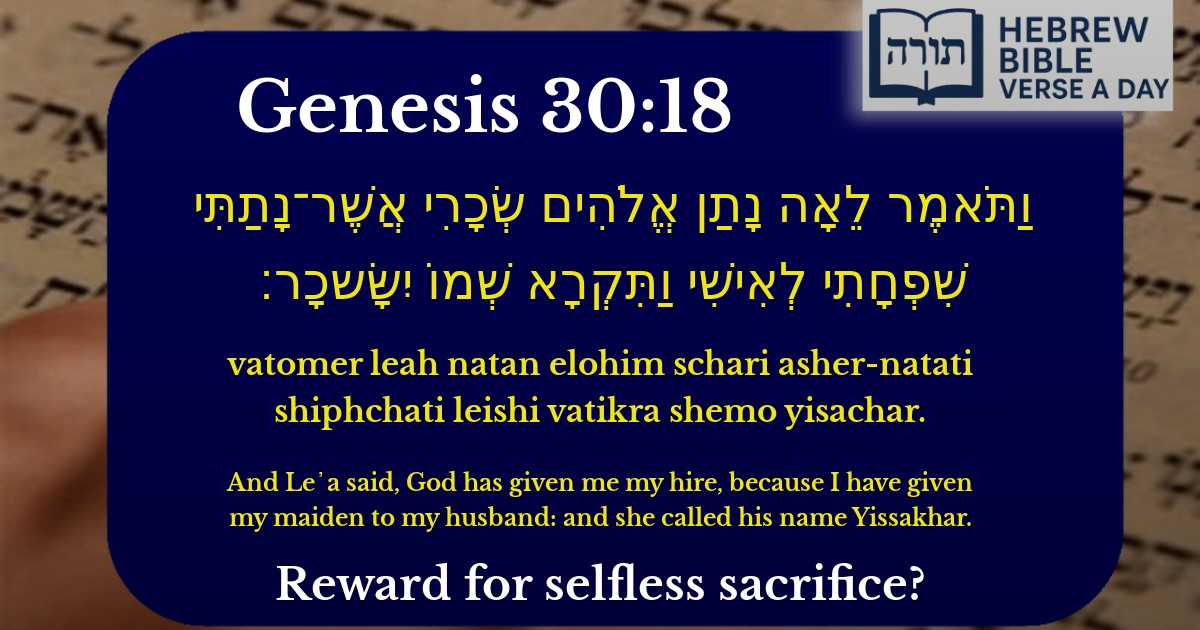Join Our Newsletter To Be Informed When New Videos Are Posted
Join the thousands of fellow Studends who rely on our videos to learn how to read the bible in Hebrew for free!
Hebrew Text
וַתֹּאמֶר לֵאָה נָתַן אֱלֹהִים שְׂכָרִי אֲשֶׁר־נָתַתִּי שִׁפְחָתִי לְאִישִׁי וַתִּקְרָא שְׁמוֹ יִשָּׂשכָר׃
English Translation
And Le᾽a said, God has given me my hire, because I have given my maiden to my husband: and she called his name Yissakhar.
Transliteration
Vatomer leah natan elohim schari asher-natati shiphchati leishi vatikra shemo yisachar.
Hebrew Leining Text
וַתֹּ֣אמֶר לֵאָ֗ה נָתַ֤ן אֱלֹהִים֙ שְׂכָרִ֔י אֲשֶׁר־נָתַ֥תִּי שִׁפְחָתִ֖י לְאִישִׁ֑י וַתִּקְרָ֥א שְׁמ֖וֹ יִשָּׂשכָֽר׃
וַתֹּ֣אמֶר לֵאָ֗ה נָתַ֤ן אֱלֹהִים֙ שְׂכָרִ֔י אֲשֶׁר־נָתַ֥תִּי שִׁפְחָתִ֖י לְאִישִׁ֑י וַתִּקְרָ֥א שְׁמ֖וֹ יִשָּׂשכָֽר׃
🎵 Listen to leining
Parasha Commentary
📚 Talmud Citations
This verse is quoted in the Talmud.
📖 Berakhot 7b
The verse is referenced in a discussion about divine reward and human actions, illustrating how Leah perceived her reward from God for giving her maidservant to Jacob.
📖 Megillah 14a
The verse is mentioned in the context of discussing the names of the tribes of Israel and their significance, particularly focusing on the name Issachar.


Leah's Gratitude and the Naming of Yissakhar
The verse (Bereishit 30:18) records Leah's declaration upon the birth of her son Yissakhar: "God has given me my hire (שכרי), because I have given my maiden to my husband." This reflects Leah's recognition of divine reward for her actions.
Rashi's Explanation
Rashi explains that Leah felt she was being compensated for giving her maidservant Zilpah to Yaakov as a wife (when she could no longer bear children herself). The name Yissakhar (יששכר) contains the word "שכר" (reward), alluding to this concept of divine repayment.
Midrashic Insights
Philosophical Dimension
The Rambam (Hilchot Teshuva 9:1) discusses how divine reward often comes in unexpected ways. Leah anticipated more children as reward, but received Yissakhar who would father a tribe known for Torah scholarship (as per Divrei Hayamim 1 12:32).
Onomastic Significance
The Malbim notes that the name Yissakhar reflects the Jewish concept of "שכר ועונש" (divine reward and punishment), teaching that God meticulously rewards even difficult personal sacrifices made for proper family relationships.